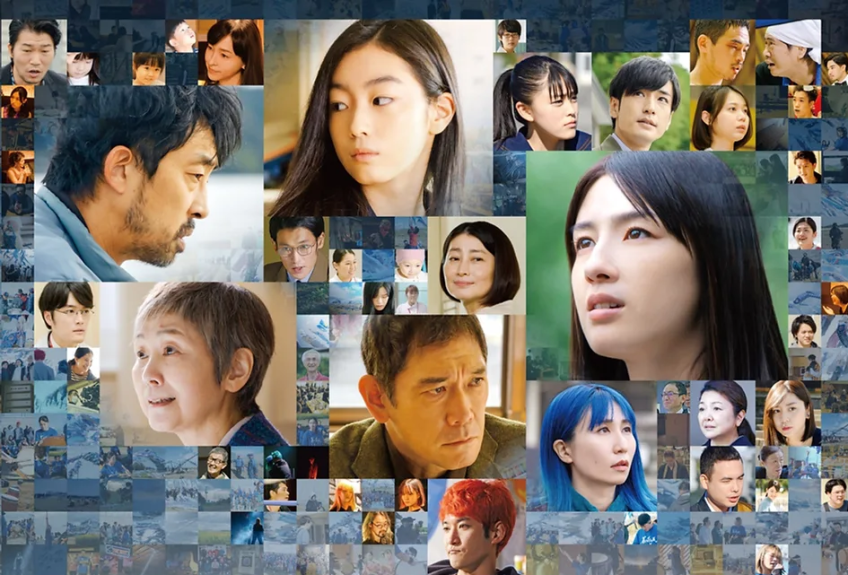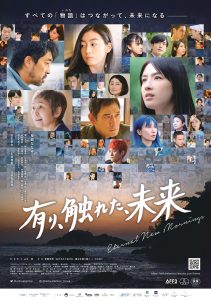Remembering the Tohoku Earthquake and Tsunami in 2024
11 March 2024 marks the 13 year anniversary of the Great East Japan Earthquake and Tsunami. Our charity who supported the orphans of the tsunami disaster closed last year, however, we are still in touch with the orphans and their communities who survived the natural disaster.
Our trustee Yuka Harada-Parr went back to the Tohoku region which was struck by the tsunami 13 years ago. Yuka went to see how the area has been recovering and to stay in touch with the people the charity has been close with over the years.
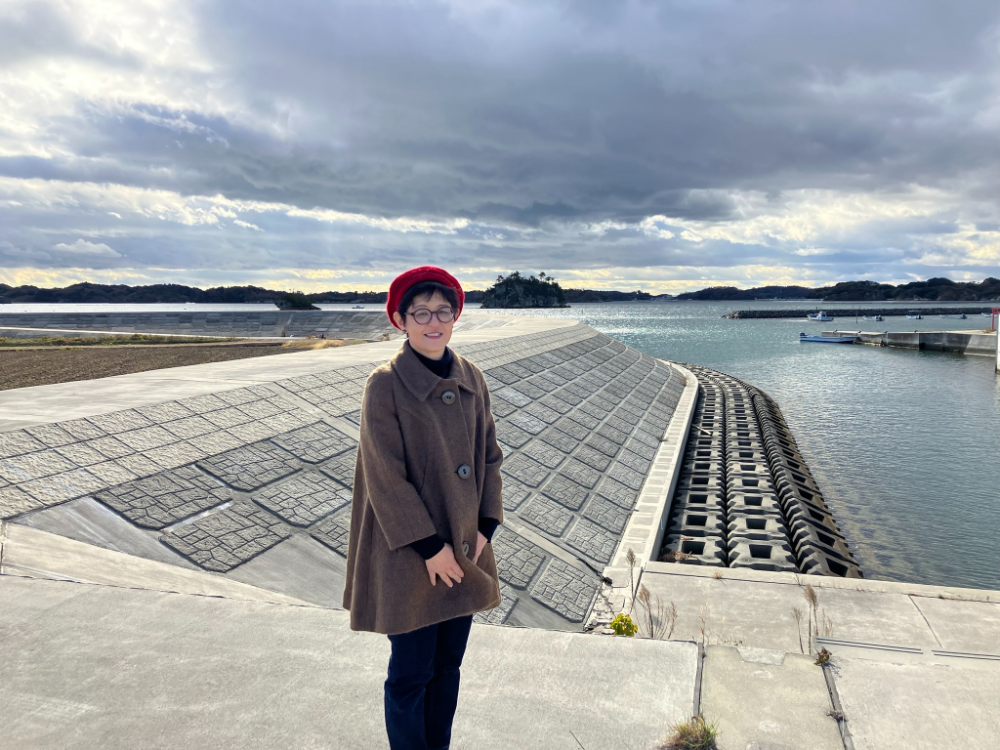
Day 1: Friday 1st December
Arrived at Honshiogama at 11:00 am
Today is a packed schedule and Mr. Saito took me for a bit of early lunch at his favourite Ramen noodle restaurant. Mr. Saito ordered, “A vegetable noodle with a half portion noodle” and I followed his advice. It was a huge amount of freshly cooked vegetables, very tasty and filling but not heavy and we warmed up to be ready to visit locations of the film Eternal New Mornings.
We visited the location where the first scene of the trailer was filmed. It was a big empty space surrounded by concrete seawalls. All of them were constructed after the Tsunami and it was a residential area before. I cannot imagine that there were once a lot of houses here.
I stood by the signage that marked the arrival of the Tsunami. The sign said that the Tsunami reach 787 cm high at this point and was 0.6 km inland from the sea. This is a place that Akemi and Richard have visited before. Currently at the Nobiru coast, there is nothing built in this area. I was speechless that it was a residential area with bustling communities before.
Mr. Saito took me to the ex-Nobiru primary school. This school was ruined after the disaster but Ms. Mitsui renovated the school and set up a facility that educates disaster prevention skills through community activities called KIBOTCHA: https://kibotcha.com/ (KIBOU= Hope, Bosai = Disaster prevention and Future). There is accommodation, glamping, restaurant, library and lecture room. In the ground floor meeting room there is a big wall picture of a blue koi carp done in chalk.
Mr. Saito gave me a full two-hour lecture about the 2011 Tōhoku Earthquake and Tsunami. It included some actual video footage of the moment the Tsunami surged; an interview with Honoka Shino who lost her grandfather when she was in Year 6 at Nobiru Primary School; a documentary about two young storytellers, Ryo Koyama and Ayano Saito. These young storytellers told how they came to express their emotions and became storytellers to keep their memories alive. They also emphasised how important it is to pass one’s own experiences on to everyone else, from the perspective of public duty and to help mental wellbeing for those who must to carry on living with their tragic past.
Two comments from these young storytellers which I felt resonated strongly were:
“It is not the same to forget and to overcome.”
“After 12 years the towns have changed but people’s core feelings will never change.”
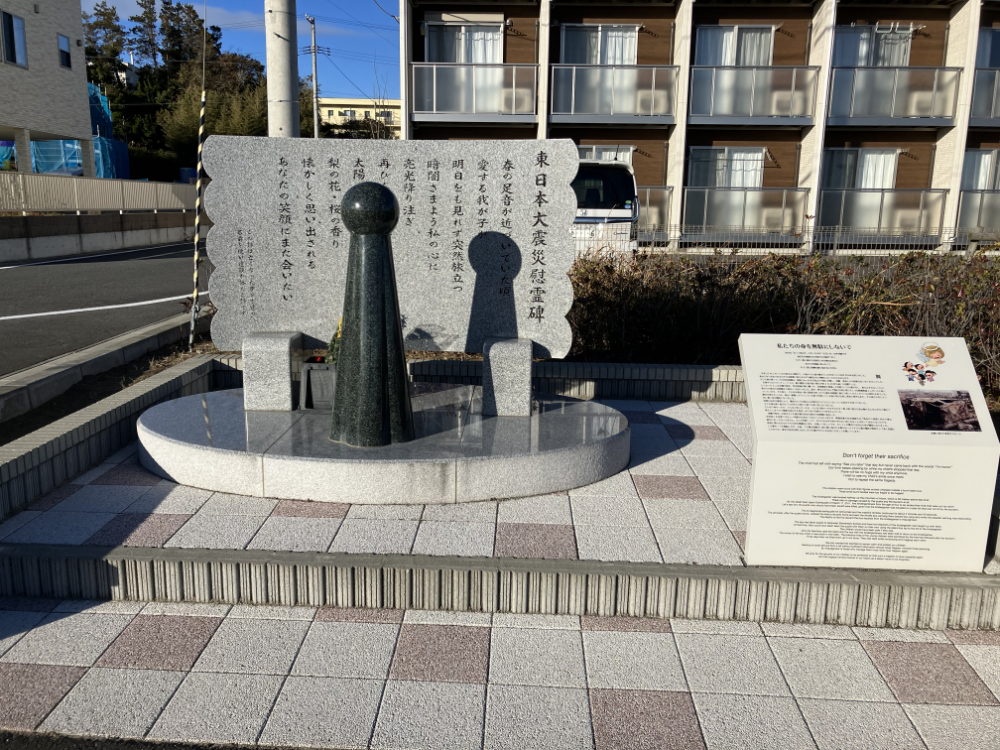
Day 2: Saturday 2nd December
I was surprised when I went down to the dining room because I was not expecting much for breakfast in a business hotel, however, a very homely buffet (as if you stayed at your friend’s house) was provided! They even served Zunda mochi (Miyagi Prefecture’s delicacy rice cake).
The second day began with a full stomach.
In the morning we made a visit to Ōkawa Elementary School, and in the afternoon we had a meeting with orphans in Ishinomaki. At the end of the day I participated in a disaster management training workshop in Aoi town, reconstructed by the students from the Faculty of Environment and Information Studies at Yokkaichi University in Mie Prefecture.
Saito Sensei picked me up from the hotel at 8am. First, we went to Ishinomaki, where Ōkawa Elementary School is located. Ōkawa Elementary School was the most severely affected by the Tsunami with 74 students and 10 teachers and staff killed.
I was not sure how to prepare myself to visit a place where the sheer scale of the tragedy had happened. The information alone was suffocating. Saito sensei’s car drove along the Kitakami River. The difference between the right and left sides of the river, and the slight difference in the undulations, is that one side had been swallowed by the tsunami and turned into a clearing, while the other side is lined with former dwellings. As the car approached the mouth of the river, the buildings disappeared and a wide space opened up, similar to the Nobiru beach we visited yesterday.
The Shin-Kitakami River is on the left and the Fuji River on the right. Somehow the children of Ōkawa Primary School followed their teacher to evacuate at what is known as the triangular point where these two rivers intersect, and 74 children lost their lives. Standing at the point and looking around. Saito Sensei stopped the car here and told me that many children had been swept away here. On the other side of the river, the remains of the Ōkawa Primary School could be seen.
We got into the car again and went to Ōkawa Primary School. There were three fathers of victims of the tsunami there who were volunteer storytellers and tour guides. One of the fathers, Mr. Shitou was giving a tour and I was able to join. Mr. Shitou lost his second daughter, Chisato, who was in fifth grade at the time. Even today, Mr. Shitou and other parents who lost their children volunteer to explain what happened at Ōkawa Primary School.
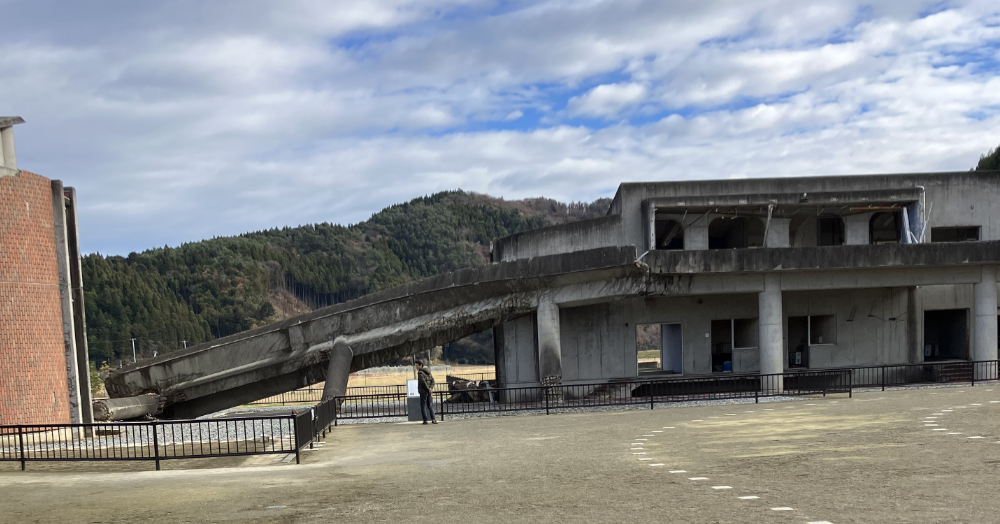
Pointing to the ruined school building, Mr. Shitou explained calmly and earnestly the situation before and after the disaster. Each word was carefully spoken, and his desire not to let the children’s deaths be in vain was clearly conveyed. I was struck by how desperately he controlled his anger, which had nowhere to go in such a quiet talk, so as not to let it boil over and explode. It was as if such regrets were still swirling inside of people in an invisible tsunami.
An independent documentary film, Ikiru (To Live), which documents how the relatives of the victims, in pursuit of the facts and reasons which caused the tragedy filed a court case against Ishinomaki City and Miyagi Prefecture has just been released in 2023. Mr Shitou carefully pointed to various parts of the remains and explained calmly what had happened on the day of the disaster. At the end of the tour, all of us visitors climbed up to the high ground behind the school. He told us that there was one teacher who had evacuated to this hill on the day of the disaster and survived. If everybody had evacuated with him up here, then everyone would have been saved. He quietly swallowed his deep regret.
After lunch we headed to the Ishinomaki Grand Hotel where we met Kana whom our charity have been supporting over the years, as she lost her parents to the tsunami. Seiko-san the grandmother of Manami who is one of the orphans and now at university and therefore could not join, also came. Our conversation covered what happened at the time of the earthquake, the launch of our charity, the mental support being provided (or not), and the current situation. It was quite a heavy subject to talk about and it also included talking about Akemi Tanaka’s death and the charity’s situation after the loss of Akemi. However, thanks to Seiko’s exuberant cheerfulness and happy spirit, the conversation was surprisingly fun (!)
The words which most resonated with me were when Seiko-san said, “I can’t do anything for people who are grieving forever like my granddaughter, but it’s important to be there. It’s not about doing something for them, it’s about being there for them when they need somebody.”
It is impossible to completely heal the hearts and minds damaged by the disaster, and mental care is a lifelong issue. Children who have been affected by the disaster are at various stages of growing up and suffer one after another, which is unthinkable for those who have not experienced the disaster. When they grow up and fall in love, if their partner is someone who has not experienced the disaster, they cannot shake off the feeling that no matter how hard they try, they will never be able to understand what they experienced as children and they stubbornly deny the past to accommodate their partner.
I was reawakened to the importance of Aid For Japan’s 12 years of supporting the orphans emotionally. It was the first time I truly understood the gravity of the charity’s work for the victims and the community. The charity will close, but we hope to stay connected with those we have engaged with in the past and those we have met in Tohoku on this trip. We parted with smiles and promised to meet again.
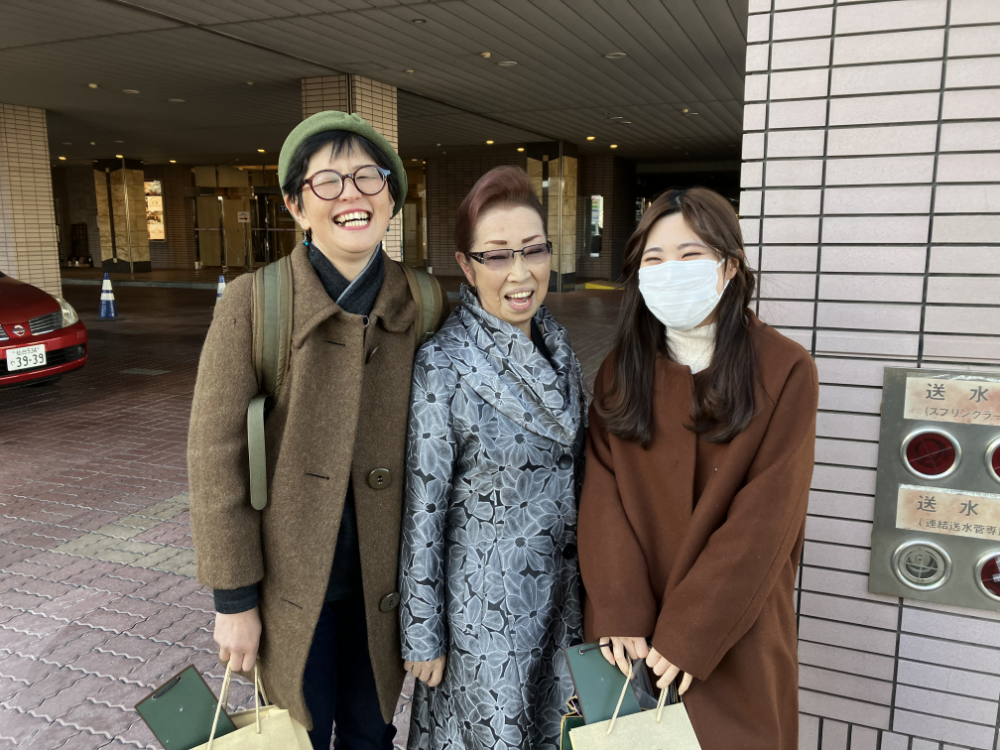
After leaving Ishinomaki Grand Hotel, we visit Kadonowaki Elementary School and MEET Kadonowaki, Ishinomaki City Earthquake Remains (https://www.tohokukanko.jp/en/attractions/detail_1003888.html). Unlike Ōkawa Elementary School, where we visited in the morning, Kadonowaki Elementary School, which is an official earthquake ruin of Ishinomaki City, has perfectly preserved exhibits and is an excellent museum that can be easily viewed on your own without a tour guide. Although Ōkawa and Kadonowaki Elementary Schools were both affected by the disaster, Ōkawa Elementary School, which was the subject of a lawsuit against the city, is not recognised as official remains, which seemed to symbolise the difference in the wounds caused by the disaster.
There was a display at MEET Kadonowaki about five toddlers of Hiyori Kindergarten, who were left on the bus and lost their lives. The shoes of one of the victims, Airi Sato, were among the displays and it was still so vivid and I felt horrified at the incident. I thought I had understood the disaster to some extent through my involvement with the charity, but seeing the disaster area with my own eyes, walking there, and hearing the stories of the victims overwhelmed me with an understanding that was not only in my head, it seemed greater than reality.
The information and what I experienced was so profound that I cannot put it into words. I felt that I had been struck by something unknown, and even though I read the materials I had collected, the books I had purchased, and the book Saito sensei had given me, I could not actualize the matter truly and it made me feel at a loss. However, I felt I understood a little about how hard it is to go forward while facing immense hardships at the same time. I admired Saito sensei for his energy, his positive attitude, and his generosity. I sincerely respect him on all accounts.
After leaving Kadonowaki Primary School we went to our last stop of the day, Aoi West Assembly Hall in Aoi District, Higashimatsuyama City, where Saito sensei was to give a lecture at a seminar on Disaster Prevention with university students from Yokkaichi University’s Faculty of Environment and Information Studies.
Before the seminar, Saito sensei showed me around quickly the Aoi area, which has successfully achieved its goal of creating the best reconstruction housing area in Japan. The town is the largest collective relocation area in Higashimatsuyama City, where 580 households are living after 1,110 deaths and 24 people are missing. This town was created by the administration and residents working together to rebuild the town and community. There are some strict rules, for example, neighbourhoods are 1.5 m from each other, and trees are planted. Fences should be transparent and less than 1.2 m high to prevent accidents like children falling off them. Although the rules are quite strict, they created an environment that everyone can be proud of by improving the overall appearance of the town.
In addition, innovations have been made to improve the quality of life for the public such as parks and assembly halls and pets for the community as a whole. There were many lessons learned to benefit all people, not just survivors who had overcome the truly painful and sad disaster of the earthquake. Everyone was helping each other without pity and hopeful towards the future; working hard to find a solution, not just the right answer. From Saito sensei’s lecture, I chose one keyword or phrase I have learned: “Otagaisama”, which means mutual respect, “So do I”.
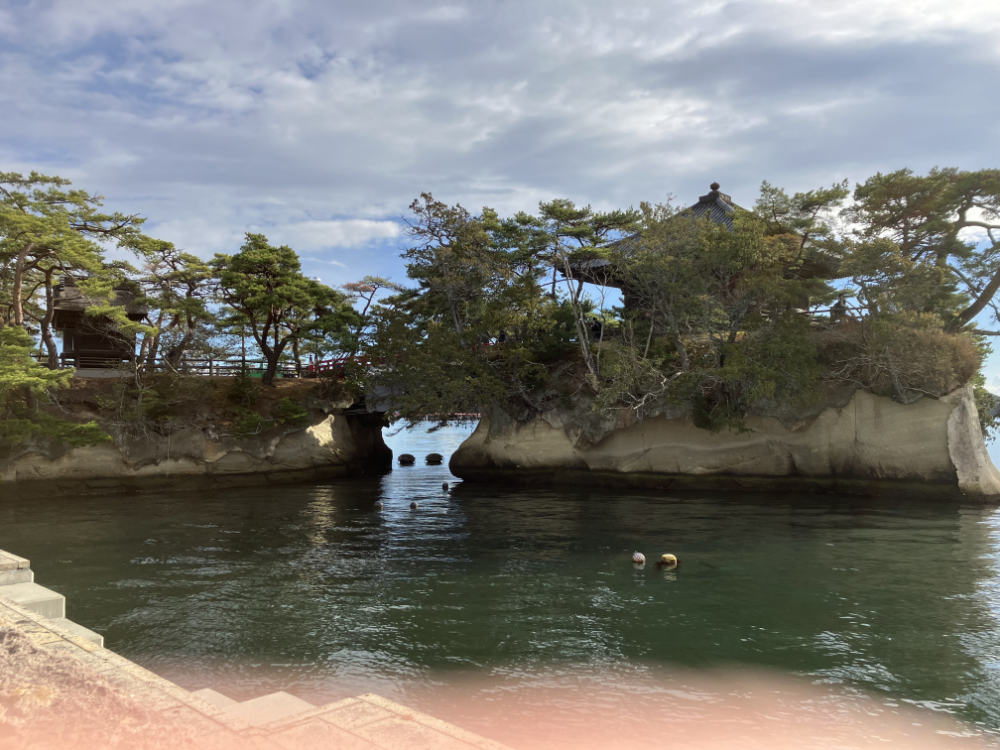
Day 3: Sunday, 3rd December 2023
On the last day, I planned to take a famous Matsushima cruise for sightseeing, as I had to leave Sendai to back to Kyoto at noon, but the Tsunami warning was issued after the earthquake off the Philippines in the early hours of the morning, and although the warning was lifted, I didn’t feel like taking a pleasure boat ride at that time. So Saito sensei suggested to visit a seafood rice cracker theme park, which was part of the reconstruction project after the earthquake.
The first stop was the Kaisen Senbei Shiogama, a theme park for seafood rice crackers created in the aftermath of the earthquake. The factory sells a wide range of rice crackers and you can try all samples! They were all so delicious that I ended up shipping a box of crackers to my mother’s home. Afterwards, as we had come this far, we wanted to see Matsushima, so Saito sensei gave us a lift to the sightseeing spot at Matsushima Beach, where I said goodbye to him.
Thank you very much, Saito Sensei. This trip to Miyagi was the conclusion of Charity Aid for Japan’s trip on behalf of Akemi Tanaka. This will certainly be the end of our activities as a charity, but I will not forget what I learnt on this trip and will continue to link it to new activities in the future.
Thank you!
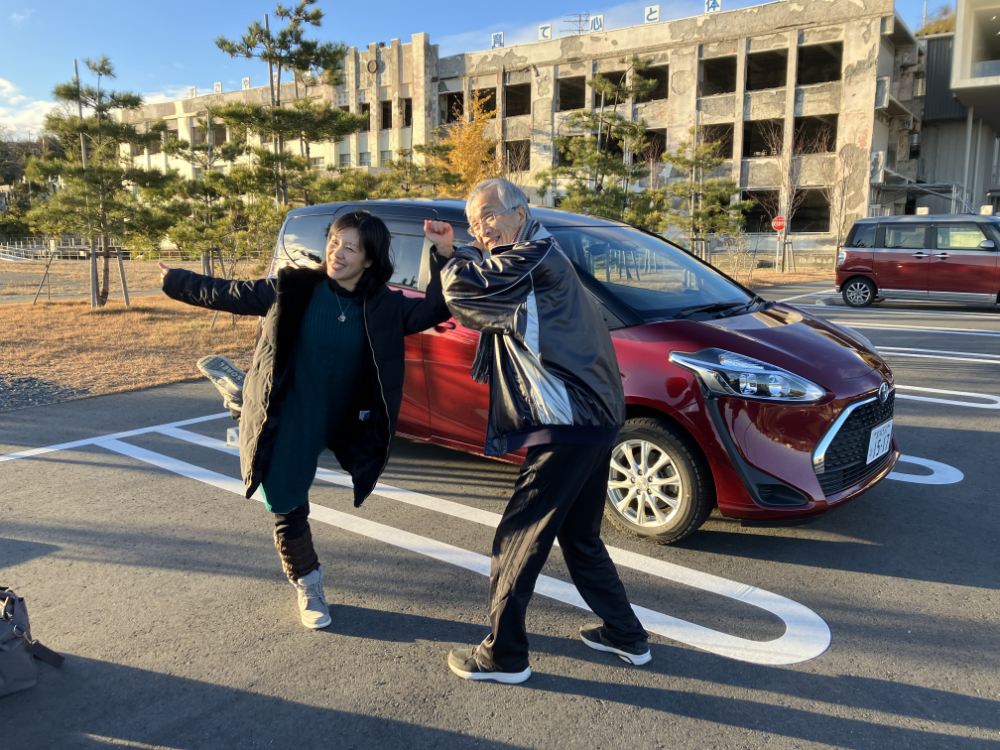

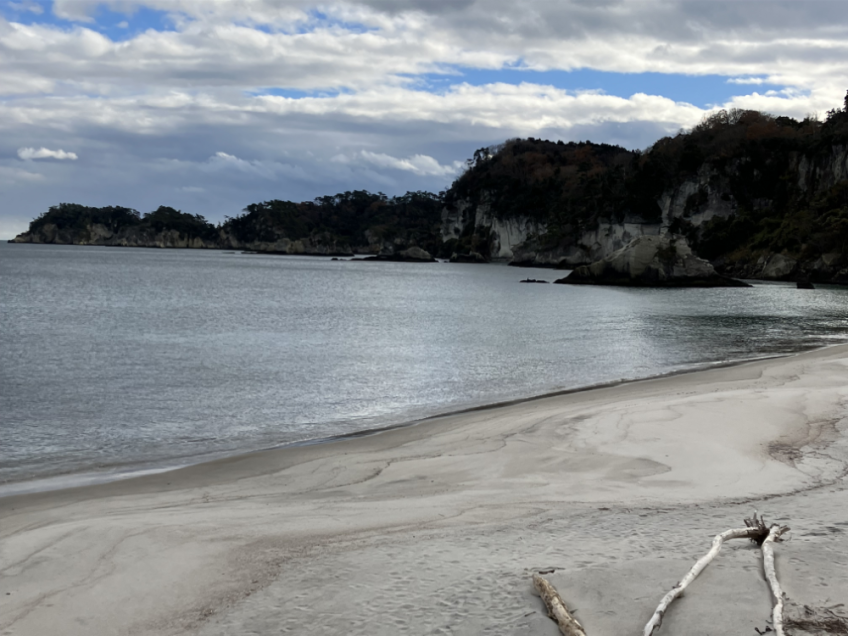
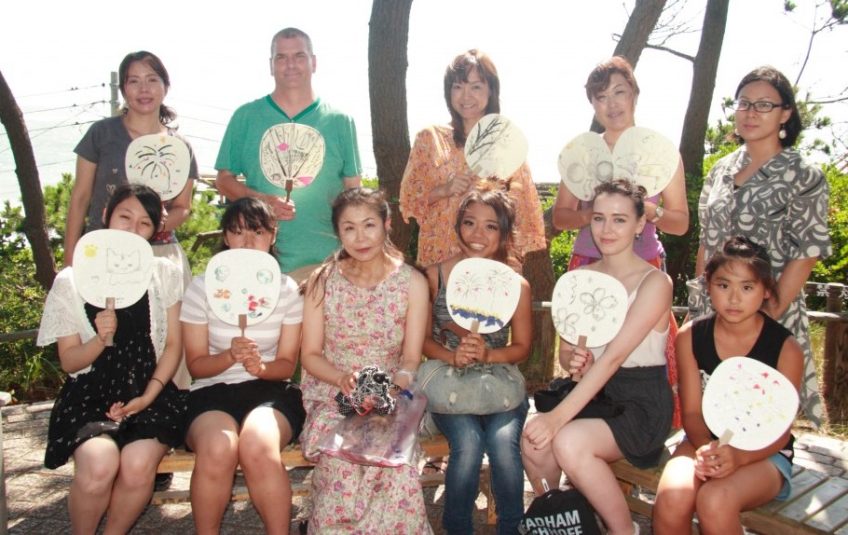
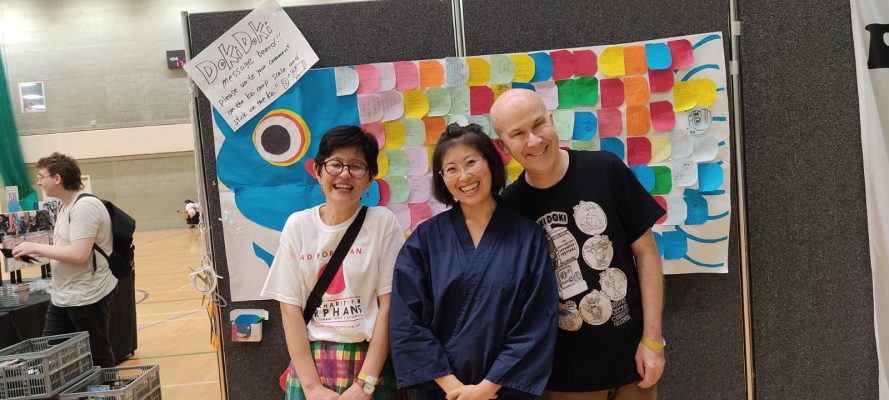
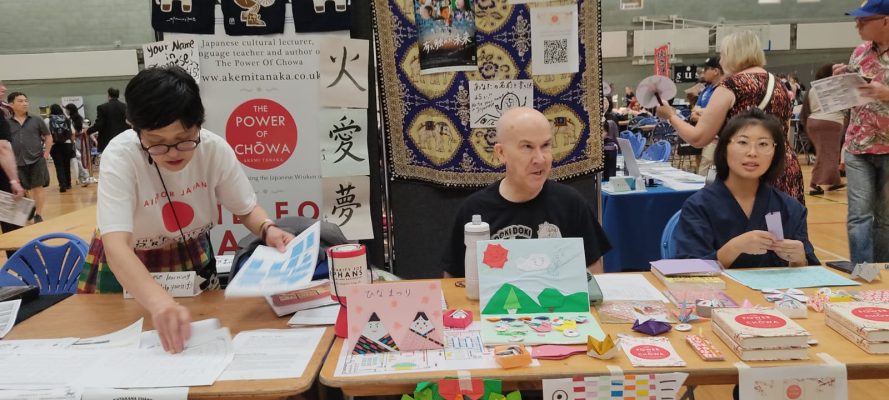
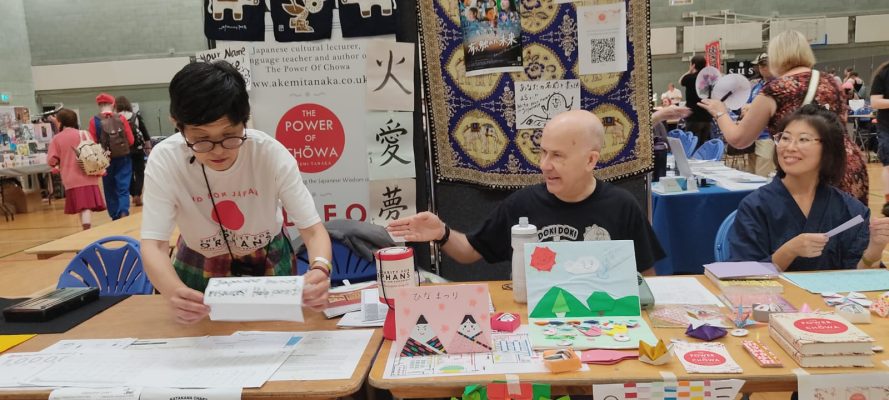
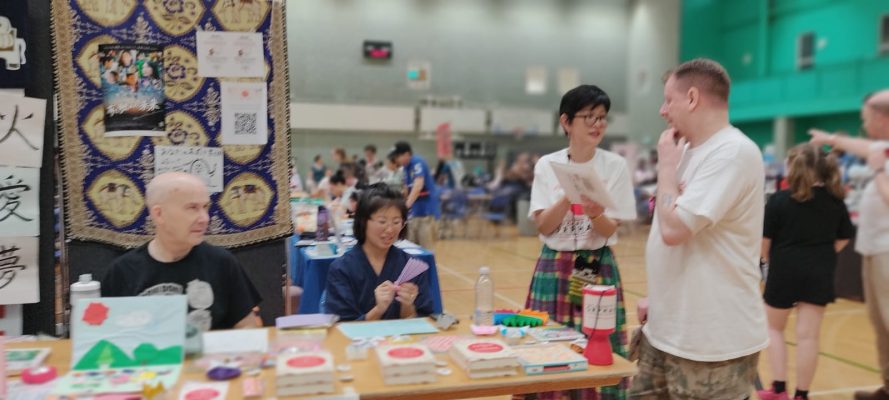
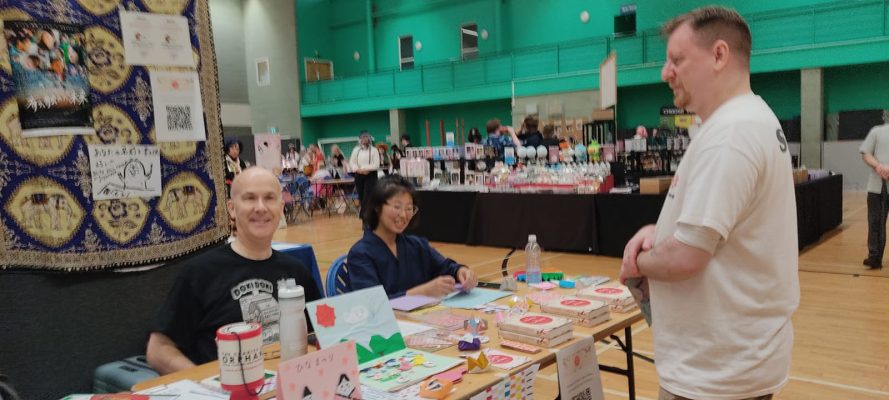
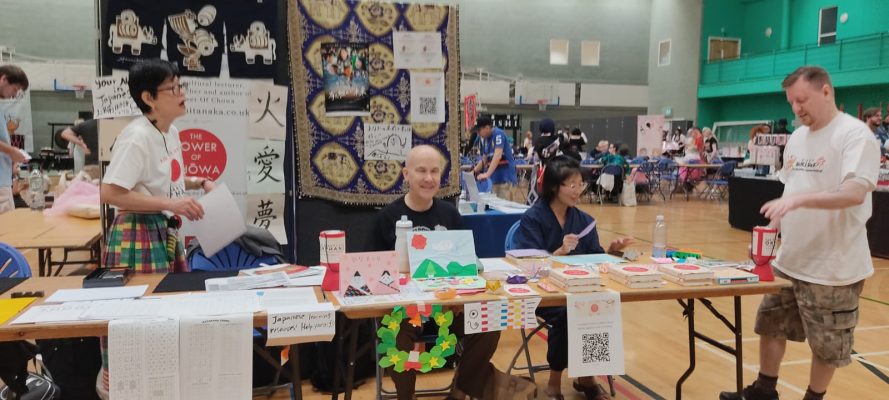
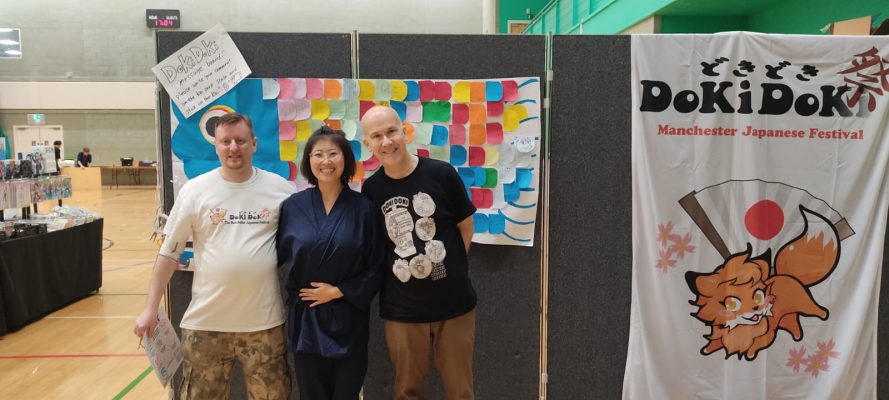
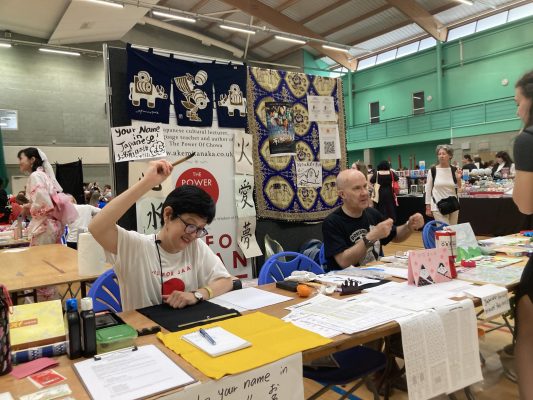
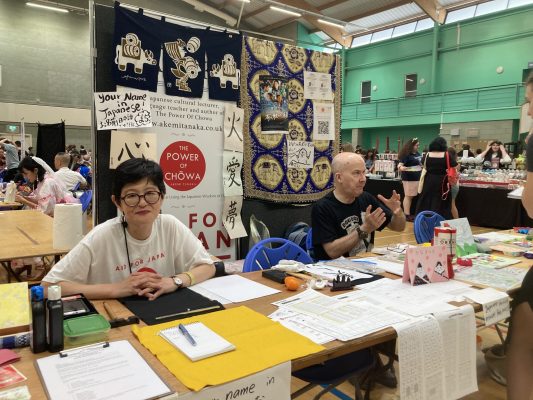
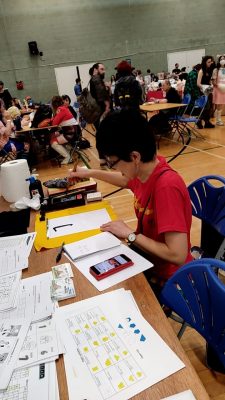
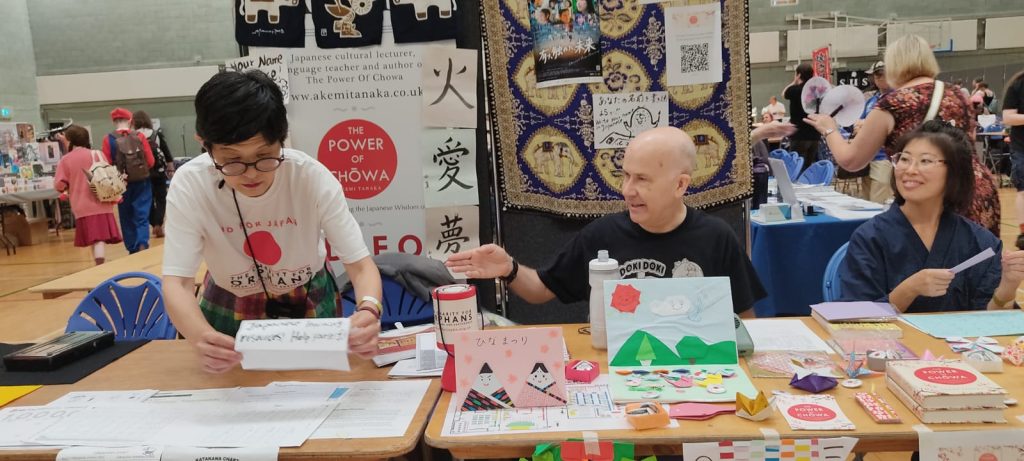
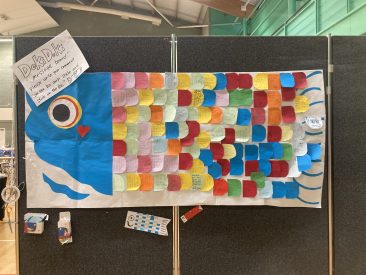
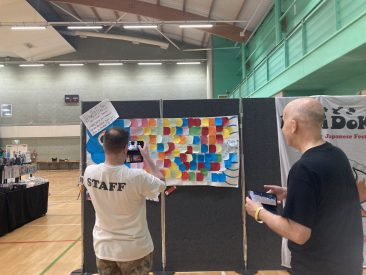
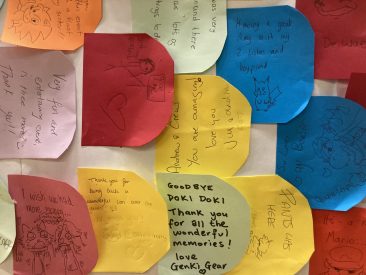
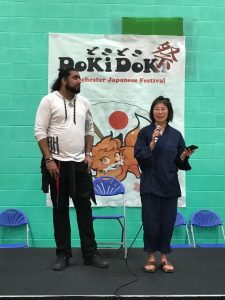 12 years ago, an earthquake struck Japan. You might remember seeing footage on the news. Debris crashed to the ground. Waves knocked buildings into rubble. People ran for higher ground.
12 years ago, an earthquake struck Japan. You might remember seeing footage on the news. Debris crashed to the ground. Waves knocked buildings into rubble. People ran for higher ground.
